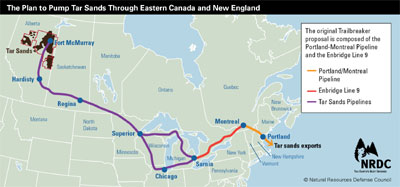29 Vermont towns overwhelmingly passed resolutions last week that oppose moving tar sands oil through the state.
It would be transported all the way from Alberta to Montreal and then through Vermont, New Hampshire and Maine, where it would be exported from Portland.
Importantly, the resolutions also call for eliminating any oil used in New England that comes from Alberta’s tar sands. They would find out exactly where their fuel supplies come from and then cut off purchases from tar sands refineries.
This recent batch of local resolutions brings the total to 33 in the region, and 49 including resolutions passed in Québec.
"Yesterday, Vermonters, in towns large and small, sent a very clear message that we are unified in our opposition to the proposed tar sands pipeline," says Max Tracy, Burlington City Councilor. "I think that folks across the state realize that the risks associated with the pipeline are far too great and that we must become less dependent on fossil fuels, not more dependent on them."
Although the nation’s focus is currently on TransCanada’s Keystone XL pipeline, Enbridge is also moving forward on an East Coast pipeline.

They want to turn the existing 62-year old pipeline that carries crude oil from Portland, Maine to Canada, into one that carries tar sands oil instead. All they need to do is switch the direction – from Canada and out through Portland.
That pipeline is owned by an ExxonMobil subsidiary, and the owners are hard at work convincing politicians and residents on its supposed benefits. The CEO and "environmental officials" from Alberta have been meeting with politicians from the three states. Editorials are appearing in local papers and they’re even leafletting homeowners about how great it will be for them …
It’s Canada’s "Plan C" option for exporting tar sands oil, just in case Keystone is rejected and they can’t ram it through First Nation’s land going to the west coast of Canada.
Tar sands would travel through AGING pipes, too thin to meant to carry tar sands sludge, through some of the most pristine areas of New England, across clear, clean streams, rivers and along Lake Sebago in Maine – the second biggest lake in the state and the source for much of its drinking water.
This highly acidic, corrosive sludge is 40-70 times thicker than conventional crude oil. It’s so thick it has to be diluted with cancer-causing chemicals such as n-hexane and benzene in order to flow through the pipeline.
"The City of Portland, Maine is seriously considering a resolution against tar sands oil," says Councilor Dave Marshall, Chair of the Transportation, Sustainability, and Energy Committee. "Pipelines that carry tar sands oil are more risky, which makes the prospect of using an ancient pipeline to bring tar sands oil through Maine a scary prospect. It is even more concerning when the pipeline runs through the watershed of Sebago Lake, perhaps the best drinking water supply in the world. Additionally, the pipeline ends in South Portland, where the Fore River delta meets Casco Bay, a rich marine habitat and the key to our tourist industry. Portland has everything to lose, and nothing to gain from transportation of tar sands oil through our region and the State of Maine."
In January, more than 1,000 protesters rallied against the pipeline in Portland, Maine.
Here’s the list of towns that have passed resolutions so far:
